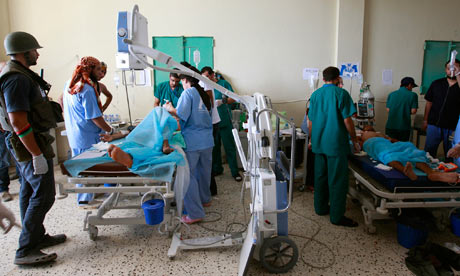The body of Libya’s bloodthirsty tyrant, Muamar Gaddafi, naked on the concrete floor of a meat locker in Sirte on 20 October 2011, was the shocking start of the Democratic Republic of Libya.
“The tyrant is dead. Long live the new President, “spoke Dr. Ahmed Tabuli, the Libyan ambassador to The Hague during his ceremonial reception on the occasion of the celebration of two years revolution. But who in the world knows the new president, a certain Dr. Margarief Muhammad, a professor of electrical engineering from Atlanta, Georgia U.S.?
His Excellency Tabuli’s face exuded fear about what once was and what still is to come. Once upon a time even this ambassador was handpicked and appointed to the post in The Hague by this bloody tyrant Gaddafi himself.
The new leaders of the Democratic Republic of Libya walked around in dark western business suits rather that Gaddafi’s flamboyant colorful flowing desert robes which became his trademark. Nowhere was even a glimpse of a Bedouin tent either.
In 1981, actor Anthony Quinn shaped the formidable image of Omar Mukhtar with his performance in “The Lion of the Desert” which became the role model for guerrilla leaders of Libya. The brave struggle against Mussolini’s murderous violence and Rodolfo Graziani ruthless troops transformed the terrible Omar Mukhtar into the spiritual father of Colonel Muamar Gaddafi.
Gaddafi became the hero and liberator of his Bedouin people and finally, in his delusional megalomania, the hero of all oppressed on earth. Revolutionary Irish in Belfast, Lockerbie bomb explosions and attacks on wicked nightclubs became the plight of Gaddafi’s holy war. He did not hesitate to engage the enemy, the great Satan, staring him straight in the face, even if it were the U.S.A…
Following a terrorist attack on a nightclub in Berlin on April 15, 1986, President Ronald Reagan ordered the bombing of “terrorist sites” in Jamahiriya, ” a Gaddafi residence.
About 60 people were killed, including an adopted daughter of Gaddafi. Muamar rose to the occasion as an immortal martyr who proudly stood his ground, and was portrayed among the ruins with the flesh torn body of his daughter in his arms.
But the stalwart super hero of the people, the great Solomon of peace, prosperity and wisdom, turned into a bloodthirsty tyrant, greedily scraping every penny he could steal from government coffers.
His sons ruled the enslaved even harsher, as an implacable Rehoboam, with a knout and a whip and funneled hundreds of billions to offshore accounts through ingenious corporate structures in Amsterdam, trust companies and banks on Curacao and in Austria.
Pecunia non olet always was and still remained the Vespasian device of the trading nation of The Netherlands. Oil invest and Green Stream BV at Strawinskylaan Amsterdam, facilitated the Gaddafi clan with the construction and exploitation of world’s longest subsea pipeline, while Haskoning BV built ports. Both companies did business for billions of dollars.
President Muhammad Margarief has to step into Gaddafi’s giant shoes or rather desert slippers. . Damen Ship yards got a little job for eight 48–foot coastguard boats to patrol the 2,000-mile long Mediterranean coastline. The crews, eight men per boat, will also be trained in the Netherlands . It can hardly be called a mega order.
The invoice for the sixty revolution casualties, who languished for months in Dutch hospitals, is still not completely paid. Less than two third has been received of the six million Euro’s outstanding, leaving money strapped hospitals with ugly and unwelcome losses.
Gaddafi’s nasty hang over will be on President Muhammad Margarief coat tails for a long time to come.
Margarief may want to try the flowing robes of a galebya instead…


